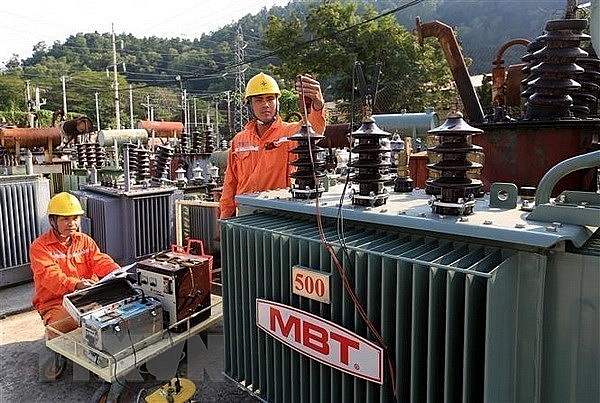Transmission boost to remove major power bottlenecks
 |
| EVN workers examine electricity facilities (Photo: VNA) |
The Vietnamese government’s permission for private companies to invest in and build power plants and transmission systems became a big step forward, bringing competition in the energy sector to a manageable level. The first 500kV super-high voltage power transmission line invested by Trungnam Construction and Investment JSC has been operating stably for more than a year.
Trungnam’s project includes a 500kV substation and transmission lines combined with a 450MW solar power plant, promoting its advantages when participating in the power grid of Ninh Thuan province and the south-central coastal region.
Pham Nhu Anh, member of the Executive Board of Military Bank, which arranged capital for Trungnam to invest in transmission infrastructure, pointed out that capital is still a bottleneck in Vietnam’s electrical infrastructure development.
According to Anh, the fact that Electricity of Vietnam (EVN) still holds a monopoly on the transmission system has created a huge burden for the group in mobilising capital for investment. According to current regulations, the credit limit for EVN cannot exceed a quarter of the unsecured capital of credit institutions.
To enable competition in the transmission infrastructure sector and allow private participation in areas that are not prohibited by law, the government is spending more time on policy adjustments for the power system.
However, many analysts also pointed out that almost all investment plans in the energy sector are still bound by state plans, thus regulations and approvals must be signed by the prime minister. This, in turn, leads to inefficiencies in creating an attractive environment for private investors.
Competition often increases the quality and reduces the price of products and services. But when the government allows private investors to generate and transmit electricity on their own lines, this could lead to potential competition with EVN.
Bui Van Kien, deputy general director of National Power Transmission Corporation (EVNNPT), said that in the current draft of the Power Development Plan VIII (PDP8), the national power transmission system should be divided into three levels: the national backbone line, the axis of the regional national electricity system, and transmission lines serving connection for power plants.
Kien confirmed the fact that there is no significant danger to national energy security because private investors still have to rely on EVNNPT for power transmission. But he still suggested, “The national and regional backbones should be invested by state-owned enterprises and this would not waste the time of private investors.”
According to Kien, the proportion of lines and substations that can be privately invested in accounts for about a fifth of the power system. He cited that the construction of transmission lines and the release of renewable energy capacity were behind schedule because of the need to apply for additional planning for the power transmission grid.
“Mechanism problems have led to the fact that many projects cannot sell electricity due to lack of transmission lines,” Kien said. “The investments in the transmission grid such as supplementing the planning and applying for an investment policy is usually behind by 6-12 months, equivalent to the time it takes to invest in a farm-sized solar power project with 50MW.”
Nguyen Tuan Anh, deputy director of the Department of Electricity and Renewable Energy under the Ministry of Industry and Trade, said that the government will provide important orientations and target principles to remove barriers and create a favourable environment for transparent and open investments from private firms in energy.
“The clear separation of the state monopoly in moderation and operation of the transmission system is very necessary,” he said. “According to current regulations, private units investing in operation management have the same rights and responsibilities for transmission prices, recovery of investment costs, and transmission operation management.”
Tuan Anh further stated, “The need to invest in large transmission projects requires quick investment to ensure capacity release, but the resources of EVN and EVNNPT are limited, so it’s urgent to mobilise resources from the private sector. To protect the state’s interest, the PDP8’s draft provides a 6-12-month review mechanism to ensure that projects will have to comply with the plans. Any project that does not guarantee progress will be transferred to another investor.”
What the stars mean:
★ Poor ★ ★ Promising ★★★ Good ★★★★ Very good ★★★★★ Exceptional
Related Contents
Latest News
More News
- Citi economists project robust Vietnam economic growth in 2026 (February 14, 2026 | 18:00)
- Sustaining high growth must be balanced in stable manner (February 14, 2026 | 09:00)
- From 5G to 6G: how AI is shaping Vietnam’s path to digital leadership (February 13, 2026 | 10:59)
- Cooperation must align with Vietnam’s long-term ambitions (February 13, 2026 | 09:00)
- Need-to-know aspects ahead of AI law (February 13, 2026 | 08:00)
- Legalities to early operations for Vietnam’s IFC (February 11, 2026 | 12:17)
- Foreign-language trademarks gain traction in Vietnam (February 06, 2026 | 09:26)
- Offshore structuring and the Singapore holding route (February 02, 2026 | 10:39)
- Vietnam enters new development era: Russian scholar (January 25, 2026 | 10:08)
- 14th National Party Congress marks new era, expands Vietnam’s global role: Australian scholar (January 25, 2026 | 09:54)

 Tag:
Tag:



















 Mobile Version
Mobile Version